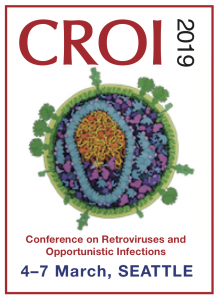Maturation inhibitor GSK’232 reduces viral load by –1.5 log at day 10
28 March 2019. Related: Conference reports, Antiretrovirals, CROI 26 (Retrovirus) 2019.
Results from a 10-day phase 2a dose-finding study for GSK2838232 (GSK’232) – a maturation inhibitor in development at GSK – were presented by Edwin DeJesus from Orlando Immunology Centre.
Maturation inhibitors bind to gag protein to target a late-stage of viral lifecycle and the development of two previous compounds in this class were stopped due to limited activity due to commonly occurring polymorphisms (beviramat) and side effects (BMS-955176).
The new GSK compound has good in vitro potency, minimal protein binding and broad-spectrum activity (including against polymorphisms associated with beviramat).
GSK’232 was given once-daily with cobicistat boosting. Doses in this two-part study were 20 mg, 50 mg, 100 mg and 200 mg – each given with cobicistat 150 mg. The 100 mg dose was run as the first part of this study.
Approximate baseline characteristics of the 33 participants (largely young white men) included mean CD4 and viral load of 540 cells/mm3 and 58,000 copies/mL (range: 1300 to 363,000), respectively.
Mean viral load decline at day 10 was –1.5 log copies/mL in the 200 mg arm and 1.2 log copes/mL on the 50 mg and 100 mg arms, sustained for several days before returning towards baseline over the following 10 days.
Steady state was reached by day 8 and most PK parameters (AUC, Cmax and C trough) showed broadly dose-proportional responses.
Resistance results at days 1 and 11 were available for 28/33 participants. Two participants (one in the 50 mg and one in the 100 mg arms) had genotypic changes at A364A/W in gag, which phenotypic resistance to GSK’232 detected at day 11 in the 50 mg participant.
Reduced baseline sensitivity to GSK’232 in another participant in the 50 mg arm only produced a viral load reduction of 0.17 log copies/mL.
Tolerability was good with no pattern form mild/moderate side effects or dose relationship, with no serious events and no discontinuations. There were no grade 3/4 lab abnormalities or clinically significant ECG abnormalities.
Reference
DeJesus E et al. A phase IIa study of novel maturation inhibitor GSK2838232 in HIV patients. Conference on Retroviruses and Opportunistic Infections (CROI), 4-7 March 2019, Seattle. Oral abstract 142.
http://www.croiconference.org/sessions/phase-iia-study-novel-maturation-inhibitor-gsk2838232-hiv-patients (abstract)
http://www.croiwebcasts.org/console/player/41311 (webcast)


 Simon Collins, HIV i-Base
Simon Collins, HIV i-Base